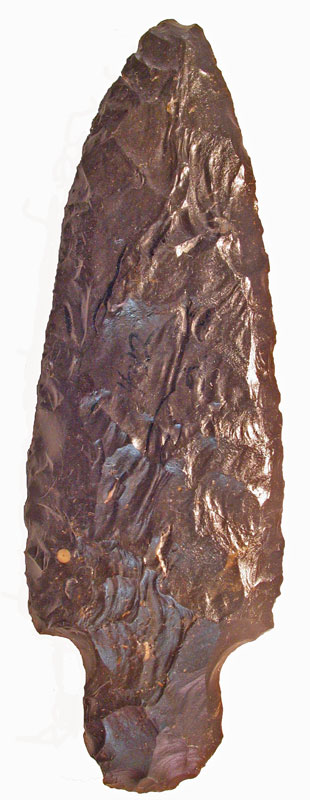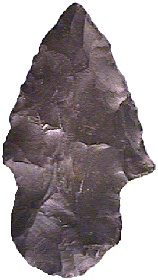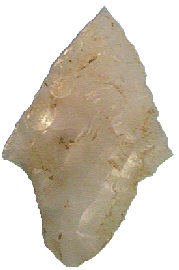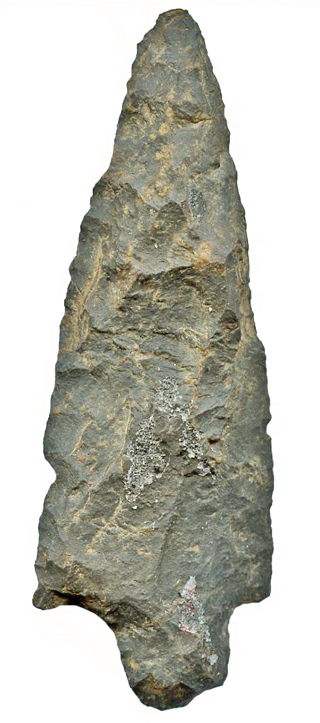







Point Type: ADENA
Also See: Adena - Dickson, Adena -
Narrow Stem, Adena - Notched Base, Adena - Robbins, Adena - Waubesa
, Adena - Wells,
Boggy Branch Type-1, Cypress Stemmed, Lagoon, Little
Bear Creek, Mason
Contracting Stemmed, New Market
Location: Eastern to Southeastern United States
Associated Dates:
3000 - 1100 B.P. - Late Archaic - Woodland
Morphology: Stemmed
General Description: The Adena projectile point and blade is a medium to large sized, thin, narrow, triangular/ovate blade that is sometimes serrated and terminates with a medium to long, narrow to broad, rounded, "beaver tail" stem. It has long been recognized as a characteristic type found associated with the Adena culture which originated in and around the Ohio Valley. Most classic Adena specimens display excellent woodland flaking knapping skills. Bases can be ground. The blade edges are usually excurvate in outline. The blades when first made were wide and had excurvate edges but as use an reworking were performed, the blade edges tended to become more straight. The shoulders vary from tapered to narrow and weak to horizontal and even sometimes are weakly barbed (although this is rare). The cross-section is biconvex with wide proportions.
It is thought that the classic Adena type developed from the earlier Cresap point type and that the Adena-Robbins emerged as a later version of the classic Adena. Many of the medium to larger Adena blades are considered as historically being utilized as blade or knife forms.
The distribution range of the classic Adena point type is quite wide in range. It is found in virtually every state of eastern North America. The majority of the points are found in the central Ohio Valley and along major tributaries of rivers in Ohio, Indiana, West Virginia, Kentucky, Alabama, Tennessee and parts of Pennsylvania.
The typical classic Adena point measures between 34 and 150 mm long with the average being 70 mm in length. The width ranges from 17 mm to 43 mm with the average being 28 mm. The thickness ranges from 7 mm to 17 mm with the average specimen being 10 mm thick. The point was first described and named by William C. Mills in his 1902 book "Excavation of the Adena Mound" for points he found at the large mound on the Adena Estate of Governor Worthington in Ross County, Ohio. This site was the place that the Adena culture was first defined and studied.
About the Point Above
(Left): The extremely large Adena blade or
spear point pictured at the top left of this page, was
found near the town of Bakerstown, Allegheny Co, Pennsylvania
and is from the former Ralph Whitehead collection of Boston, Mass.
The Blade is made from a very glossy dark chocolate brown chert material. The
point has a small tip ding and a small right hand shoulder blade ding. Overall,
the point measures a whopping 123 mm in length, and is 41 mm
wide just above the shoulder barbs. It is 10.8 mm thick at 41 mm up from
the base with the majority of the blade being between 9.5 and 7 mm thick.
The stem is 26 mm long and is 22.6 mm wide. The left side of
the stem base has an old historical ding. The blade edges show
some fine retouch work that is from historical times. There is some
amount of surface patina on the blade especially in the knapping fissures.
Catalog Number 123-168-O
About the
Point Above (Left Center):
About the Point Above (Right Center): The small Adena point pictured at the top right center of this page, was found in 1977 on the surface of a washout at the famous Baldwin Station site, along the Housatonic River, Milford, New Haven Co., Connecticut. The point is made from milky quartz which is very fine grained. Overall, the artifact is very thin for the material used. The stem is tapered and not as bulbous as the specimen on the left. Overall, the point measures 38.5 mm in length, is 25 mm wide across the shoulders, and is only 7 mm thick in mid blade. The stem is 15 mm long and measures 13 mm wide. The more and more I think about this point it may be a strong shouldered Rossville? Your Opinion is desired. Email me. Catalog Number 46-5-B
About the Point Above (Right): The large Adena point pictured at the top right of this page, was found in Fox River area of Wisconsin. It is made from a dull dark black chert material. The point has a small tip ding and a small blade ding. Overall, the point measures 92 mm in length, and is 35 mm wide at the shoulder barbs. It is 11 mm thick at 41 mm up from the base with the majority of the blade being between 6 and 7 mm thick. The stem is 14 mm long and is 17 mm wide. The right side of the blade shows some retouch work that is from historical times. This rework lends to the blade's asymmetrical outline. There is a large amount of surface patina on the blade and even some lichen growth. Catalog Number 241-34-E
References: Baker, Bell (1), Cambron & Hulse, Dragoo (f), Fogleman, Hranicky (1, 2), Justice (1), Overstreet, Perino (1), Waldorf
© Copyright 1997 - 2008 LITHICS-Net WWW.LITHICSNET.COM
Use your Browser's BACK Button to return to the LITHICS-Net Index.